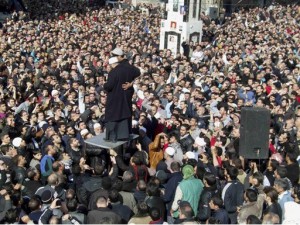Looking around the world, the striking characteristic is waiting out a number of crises. Their outcome seems almost artificially suspended, and their interaction on one another and their ultimate effect on the world is at issue.
We start with the Euro. Chancellor Angela Merkel’s supplications in Beijing were perhaps laudable but a little ridiculous. There is no evidence Beijing could or would bail out the Euro. Meanwhile, Greece appears headed inevitably for default — if for no other reason than the severe austerity measures are not only the proverbial late closing of the barn door but making it impossible for growth necessary for any climb out of its debt bind while increasing social deterioration.
Can Spain, Portugal, and perhaps Ireland, be far behind? Meanwhile, Germany refuses to assume the role its hard work, discipline and export-led economy has bestowed as the main source of reserves to refinance the European Union. We wait.

Israel, the U.S. and Iran wage a ferocious propaganda war, with the mullahs’ repeating their unprecedented threat to Jerusalem’s existence. Sanctions are having a disastrous effect on the Iranian economy. But past history demonstrates third world economies have no bottom — especially those propped up by oil revenues skirting restrictions to reach markets.
But there is a consensus among Western intelligence circles Teheran continues to make progress toward nuclear weapons of mass destruction, perhaps even including missile delivery. Teheran surrogates also threaten Israel and the West in Lebanon,Gaza, Iraq and Afghanistan and with worldwide terrorism. How much coordination continues between Israeli policymakers and Washington has become an issue. We wait.
Syria, Iran’s ally, descends into civil war with prospect its minorities’ ties to neighboring states will further derail any promise of The Arab Spring for a radical Mideast betterment. Egypt is already beset by a chaotic contest for power between the military and the Islamicists — with threatening problems of food and youth unemployment. Washington and Western Europe — surprisingly joined if ineffectively by the Arab League — has abandoned a hands-off policy on Damascus. However inevitable the fall of a 35-year-old dictatorship, the attenuated struggle typifies the absence of international collaboration against bloodshed. We wait.
The Chinese economy dips below levels conventionally held necessary to maintain stability under an authoritarian government with a rapidly growing workforce. Expanding exports and unlimited infrastructure growth, its two principal props for two decades, can no longer spur the economy with credit reaching explosive levels. A slowdown in China’s market for raw materials is the last straw for the worldwide economic malaise. Debate over policy within the Communist Party appears to have reached unprecedented levels, leaking to the highly censored but innovative personal communications networks. The argument comes on the eve of this fall’s planned transfer of generational leadership. Meanwhile, Beijing’s military power accelerates with chauvinistic rhetoric and threats over disputed sovereignty with its neighbors. We wait.
Japan’s political stalemate continues with the world’s third largest economy on autopilot. Another round in the prosecution of the generation’s most powerful politician, Ichirō Ozawa, comes in mid-February, with the perennial hope a restructuring of political factions will provide new, vibrant leadership. Meanwhile, a demographic catastrophe is overtaking the society as birth rates continue to drop with the most rapidly aging population among the industrial societies and cultural obstacles to in-migration. We wait.
Russia approaches presidential elections with growing opposition toward what appeared the inevitable victor, Vladimir Putin. Failed efforts at reform of the economy and the military coupled with incredibly destructive social phenomena — a rapidly declining population, an HIV epidemic, drug addiction and alcoholism — all point toward another implosion. Immigration of capital and young skilled professionals reinforces decline. If world energy prices drop in the face of slack economies, Putin’s formula for stability could quickly evaporate. We wait.
The world as well as the U.S. enters the apex of its election season with a confused picture. An American electorate appears more polarized than ever between interventionist and market orientation with more mundane issues largely holding the debate spotlight. The world, dependent on American leadership since World War II, seeks clues whether the Obama administration’s “lead from behind” is the leitmotiv of the coming four years with the relative success of the Paul candidacy signaling a possible new isolationism. Meanwhile, the country grapples with tenacious seesawing employment, ironically the result of technological advance as well as a credit collapse. We wait.
Sol W. Sanders, (solsanders@cox.net), writes the ‘Follow the Money’ column for The Washington Times on the convergence of international politics, business and economics. He is also a contributing editor for WorldTribune.com and East-Asia-Intel.com.

